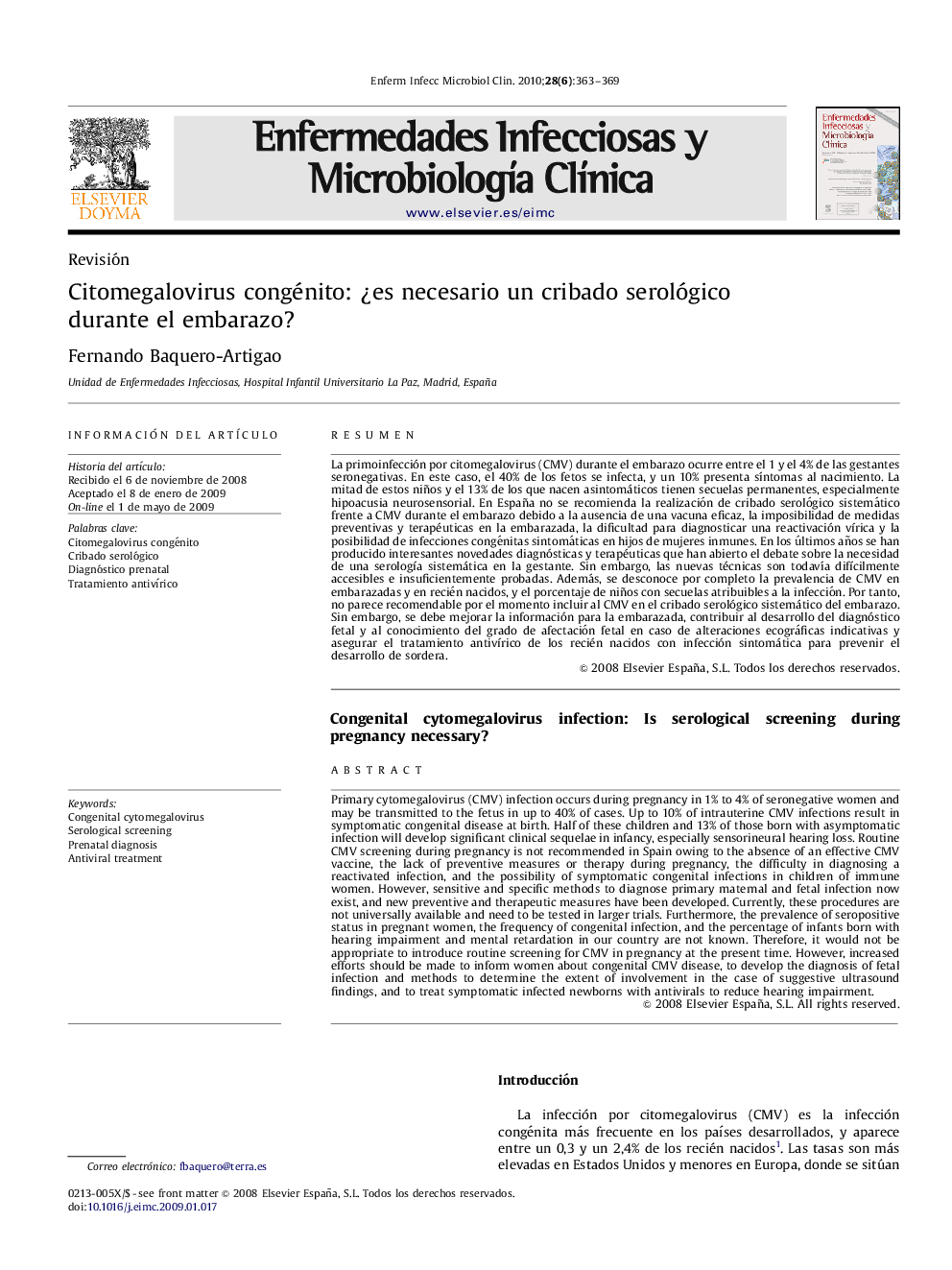| کد مقاله | کد نشریه | سال انتشار | مقاله انگلیسی | نسخه تمام متن |
|---|---|---|---|---|
| 3402029 | 1222696 | 2010 | 7 صفحه PDF | دانلود رایگان |

ResumenLa primoinfección por citomegalovirus (CMV) durante el embarazo ocurre entre el 1 y el 4% de las gestantes seronegativas. En este caso, el 40% de los fetos se infecta, y un 10% presenta síntomas al nacimiento. La mitad de estos niños y el 13% de los que nacen asintomáticos tienen secuelas permanentes, especialmente hipoacusia neurosensorial. En España no se recomienda la realización de cribado serológico sistemático frente a CMV durante el embarazo debido a la ausencia de una vacuna eficaz, la imposibilidad de medidas preventivas y terapéuticas en la embarazada, la dificultad para diagnosticar una reactivación vírica y la posibilidad de infecciones congénitas sintomáticas en hijos de mujeres inmunes. En los últimos años se han producido interesantes novedades diagnósticas y terapéuticas que han abierto el debate sobre la necesidad de una serología sistemática en la gestante. Sin embargo, las nuevas técnicas son todavía difícilmente accesibles e insuficientemente probadas. Además, se desconoce por completo la prevalencia de CMV en embarazadas y en recién nacidos, y el porcentaje de niños con secuelas atribuibles a la infección. Por tanto, no parece recomendable por el momento incluir al CMV en el cribado serológico sistemático del embarazo. Sin embargo, se debe mejorar la información para la embarazada, contribuir al desarrollo del diagnóstico fetal y al conocimiento del grado de afectación fetal en caso de alteraciones ecográficas indicativas y asegurar el tratamiento antivírico de los recién nacidos con infección sintomática para prevenir el desarrollo de sordera.
Primary cytomegalovirus (CMV) infection occurs during pregnancy in 1% to 4% of seronegative women and may be transmitted to the fetus in up to 40% of cases. Up to 10% of intrauterine CMV infections result in symptomatic congenital disease at birth. Half of these children and 13% of those born with asymptomatic infection will develop significant clinical sequelae in infancy, especially sensorineural hearing loss. Routine CMV screening during pregnancy is not recommended in Spain owing to the absence of an effective CMV vaccine, the lack of preventive measures or therapy during pregnancy, the difficulty in diagnosing a reactivated infection, and the possibility of symptomatic congenital infections in children of immune women. However, sensitive and specific methods to diagnose primary maternal and fetal infection now exist, and new preventive and therapeutic measures have been developed. Currently, these procedures are not universally available and need to be tested in larger trials. Furthermore, the prevalence of seropositive status in pregnant women, the frequency of congenital infection, and the percentage of infants born with hearing impairment and mental retardation in our country are not known. Therefore, it would not be appropriate to introduce routine screening for CMV in pregnancy at the present time. However, increased efforts should be made to inform women about congenital CMV disease, to develop the diagnosis of fetal infection and methods to determine the extent of involvement in the case of suggestive ultrasound findings, and to treat symptomatic infected newborns with antivirals to reduce hearing impairment.
Journal: Enfermedades Infecciosas y Microbiología Clínica - Volume 28, Issue 6, June–July 2010, Pages 363–369